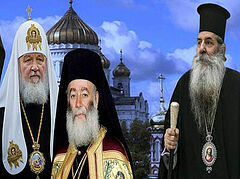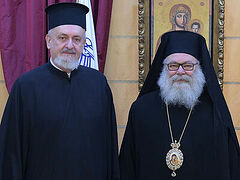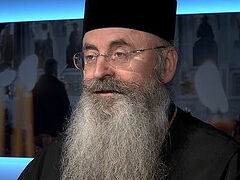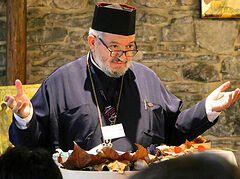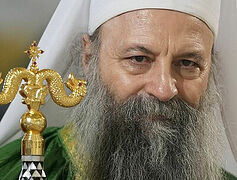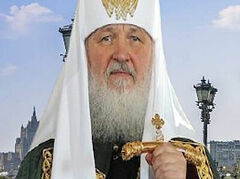 Photo: antiochpatriarchate.org
Photo: antiochpatriarchate.org
Every day, we read news about the Constantinople-Russia dispute, which has turned into an open confrontation, where both sides scramble to prove their right and legitimacy in what they claim.
At the same time, we thank God that the Orthodox Church is still privileged with the presence of sane people who clearly depict the disease that befell us and demand that both sides return to the round table to address their dissensions together in the presence of their brothers, who have the same responsibility and suffer the same pain for what is happening in Orthodoxy.
As a hierarch who lives in a concise Orthodox part of the so-called Orthodox World, that is in Europe, I would like to express my opinion on this crisis which is growing daily and affecting our existence and continuance. Unfortunately, most of those who write on this issue live in a monolithic world, where the majority is either Russian or Greek…
It’s no secret to anyone that the roots of the problem are very old. Our brothers in Constantinople have an old and enduring feeling that our Russian brothers want to appropriate their claimed historical rights. On the other side, the Russians sense a desire on the part of Constantinople to take revenge on them and fragment them and that they will do so when the opportunity arises, even if it’s through a reading of history and the canons arising from it, which Constantinople claims are its rights and the privileges it has acquired from it and has given it the legitimacy it claims today.
I return to the current painful reality that prevents us from gathering around one table in a country where we are all strangers, where we serve our brethren, the majority of whom wound up there because of life’s difficulties. What witness do we offer, as Orthodox, to the inhabitants of this country [Germany] when we are divided and unable to meet and establish a common future for all, in the face of the factors that appear in this world and that will inevitably change its demographic map?
In my humble opinion, the roots of the current crisis go back to a time far before the Council of Crete. It started when the dispute over the Church of Qatar, stirred up by our brothers in the Church of Jerusalem, which caused suffering for us in the Antiochian Church, wasn’t addressed in a serious and collegial manner. It happened when His Holiness the Ecumenical Patriarch refused to include it on the agenda of the meeting of the primates of the Churches that took place in 2014, and the other Local Churches stood by watching, despite all the calls we made during the preparatory work for the Great Council... Everybody remembers the resulting situation, still in effect today: the break of Eucharistic communion between the churches of Antioch and Jerusalem.
The issue went largely unnoticed, though it was of great importance to stop it and find an appropriate solution. Had one been reached by then, we wouldn’t have reached the point we’re at today, whether in Ukraine or Alexandria…
I represented our Antiochian Church at the last preparatory meeting before the Council of Crete, in Chambésy in 2016. I remember the concessions we presented in good faith to restore ties in the Orthodox body, and how, unfortunately, they were met by the Jerusalem side, and even by the rest of the brother primates, with a lack of earnestness, with relativization and indifference.
This is what prompted us not to sign the bylaws of the Council of Crete, and later to boycott the said council. To this day, we are still accused of boycotting the meeting in Crete under pressure from the Russian Church, which isn’t true, but mere slander that has no basis except in the minds of its promoters. Our Antiochian Synod, as expressed by our Father, His Beatitude the Patriarch, decided not to attend, as our participation would be incomplete since we wouldn’t participate in the Liturgy because of our conflict with our Jerusalem brothers.
Today, after more than nine years, this problem is recurring under different names, and we all read what is happening today between the Church of Alexandria and the Church of Russia, the potentiality of evangelization in Africa, and who has the authority to do so. I wonder if those who go to Africa from the so-called Free Churches1 are asking permission from the Patriarch of Alexandria and all Africa, or other Church officials there.
Certainly, we must return to the round table and discuss our problems in a fraternal atmosphere, so as to give an example of the conciliar spirit—that spirit that we praise whenever it suits us. If not, we will become like the sons of this world who give ear only to those in power, to those involved with the children of this age, or to the rich who buy their rights with their money.

